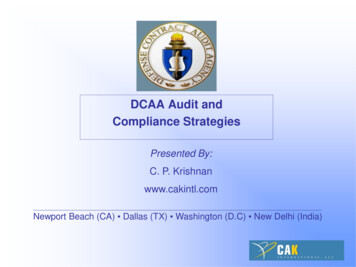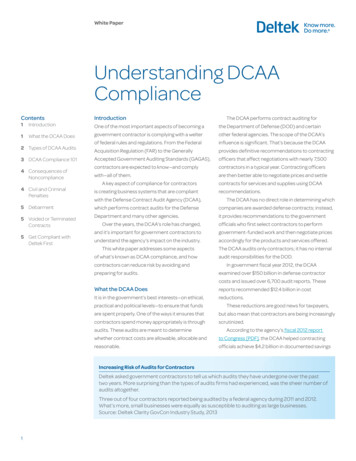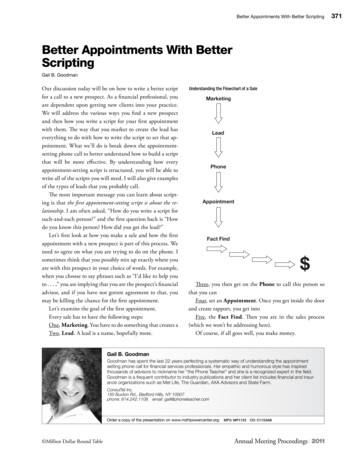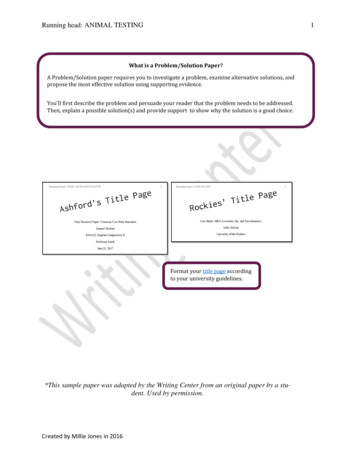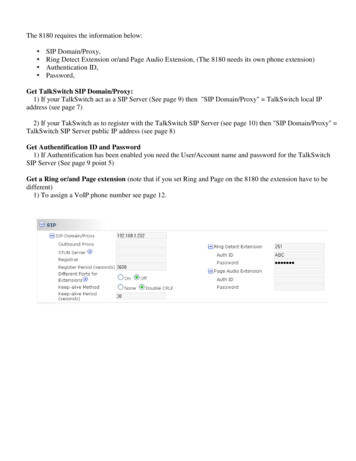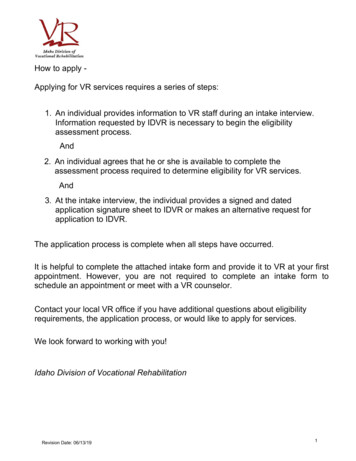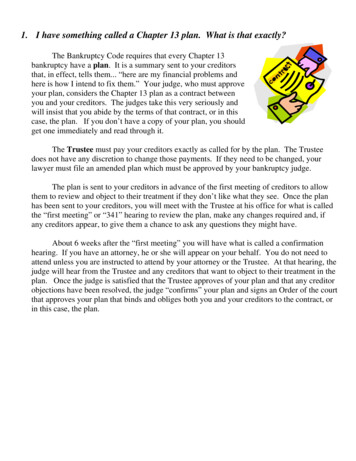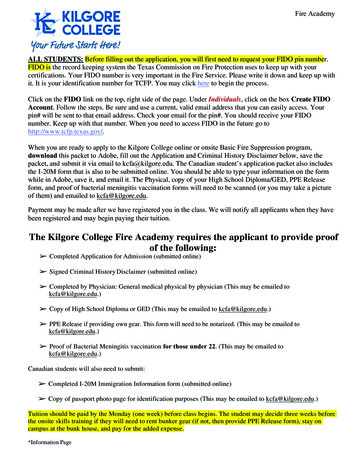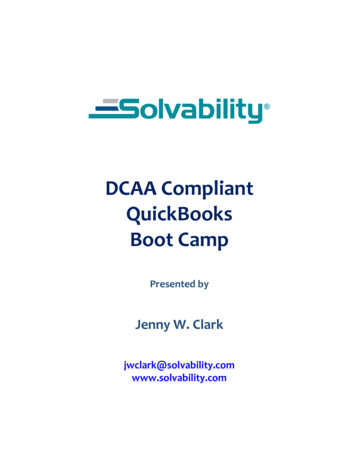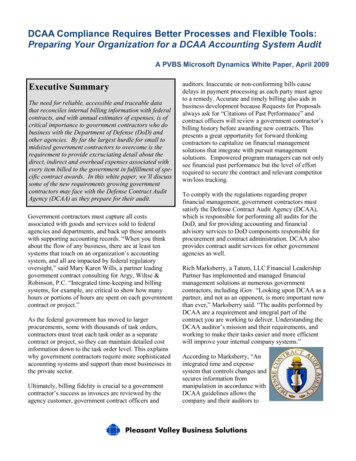
Transcription
DCAA Compliance Requires Better Processes and Flexible Tools:Preparing Your Organization for a DCAA Accounting System AuditA PVBS Microsoft Dynamics White Paper, April 2009Executive SummaryThe need for reliable, accessible and traceable datathat reconciles internal billing information with federalcontracts, and with annual estimates of expenses, is ofcritical importance to government contractors who dobusiness with the Department of Defense (DoD) andother agencies. By far the largest hurdle for small tomidsized government contractors to overcome is therequirement to provide excruciating detail about thedirect, indirect and overhead expenses associated withevery item billed to the government in fulfillment of specific contract awards. In this white paper, we’ll discusssome of the new requirements growing governmentcontractors may face with the Defense Contract AuditAgency (DCAA) as they prepare for their audit.Government contractors must capture all costsassociated with goods and services sold to federalagencies and departments, and back up those amountswith supporting accounting records. “When you thinkabout the flow of any business, there are at least tensystems that touch on an organization‟s accountingsystem, and all are impacted by federal regulatoryoversight,” said Mary Karen Wills, a partner leadinggovernment contract consulting for Argy, Wiltse &Robinson, P.C. “Integrated time-keeping and billingsystems, for example, are critical to show how manyhours or portions of hours are spent on each governmentcontract or project.”As the federal government has moved to largerprocurements, some with thousands of task orders,contractors must treat each task order as a separatecontract or project, so they can maintain detailed costinformation down to the task order level. This explainswhy government contractors require more sophisticatedaccounting systems and support than most businesses inthe private sector.Ultimately, billing fidelity is crucial to a governmentcontractor‟s success as invoices are reviewed by theagency customer, government contract officers andauditors. Inaccurate or non-conforming bills causedelays in payment processing as each party must agreeto a remedy. Accurate and timely billing also aids inbusiness development because Requests for Proposalsalways ask for “Citations of Past Performance” andcontract officers will review a government contractor‟sbilling history before awarding new contracts. Thispresents a great opportunity for forward thinkingcontractors to capitalize on financial managementsolutions that integrate with pursuit managementsolutions. Empowered program managers can not onlysee financial past performance but the level of effortrequired to secure the contract and relevant competitorwin/loss tracking.To comply with the regulations regarding properfinancial management, government contractors mustsatisfy the Defense Contract Audit Agency (DCAA),which is responsible for performing all audits for theDoD, and for providing accounting and financialadvisory services to DoD components responsible forprocurement and contract administration. DCAA alsoprovides contract audit services for other governmentagencies as well.Rich Marksberry, a Tatum, LLC Financial LeadershipPartner has implemented and managed financialmanagement solutions at numerous governmentcontractors, including iGov. “Looking upon DCAA as apartner, and not as an opponent, is more important nowthan ever,” Marksberry said. “The audits performed byDCAA are a requirement and integral part of thecontract you are working to deliver. Understanding theDCAA auditor‟s mission and their requirements, andworking to make their tasks easier and more efficientwill improve your internal company systems.”According to Marksberry, “Anintegrated time and expensesystem that controls changes andsecures information frommanipulation in accordance withDCAA guidelines allows thecompany and their auditors to
save time and to concentrate on more significantcontractual compliance issues.”DCAA conducts annual audits and requires governmentcontractors to submit Incurred Cost Proposals each year,which are contractor forecasts of the indirect, fringe,overhead, general and administrative expenses, materialand handling costs for the coming year. However, whilethe federal government allows contractors to recovermore than simply direct costs, this doesn‟t mean they cancut corners on those annual Incurred Cost Proposalestimates. Each contractor must prove to DCAA that allindirect costs are in compliance with the FederalAcquisition Regulation (FAR), which stipulates theindirect costs that can be recovered, and those which arenot allowed to be billed to the U.S. government (e.g.,entertainment-related costs).Meanwhile, DCAA also conducts surprise Floor CheckAudits as often as twice a year. These are designed toensure a government contractor‟s employees are chargingtimesheets appropriately. DCAA wants to ensure, forexample, that contracting employees are charging fortheir services daily, not once a month. In a typical floorcheck audit, DCAA officials may talk to 20 employeesand look at 100 or more time sheets to make sure laborcosts are reported accurately and in a timely fashion.Additionally, DCAA will look for certifieddocumentation when hours reported are later modified tobe in full compliance. The system must capture thereason why the timesheet changed and be approved by anappropriate supervisor.“.without the labor components that theaccounting solutions geared for government contractors, such as Dynamics NAV,have built in, the task to meet DCAA's requirements are labor intensive, costly andprone to error.”Carl Sweetnam, Black Ink, LLCIn addition, there are contract-specific audits that mayoccur, either pre- or post-award, or at any time thegovernment agency customer or contract officer decides afurther investigation is warranted. The DCAA alsoperforms a series of periodic audits of accountingsystems—called Adequacy of Accounting Systemsaudits, which are considered audits of a contractor‟s2Growing Government Contractor LeavesQuickBooks for Dynamics NAVto Ensure DCAA ComplianceSteven Miller has spent the past decade working for Governmentcontractors ranging in size from 10 million to 1 billion in annualrevenues where DCAA compliance has been one of his primaryfocuses. Miller, presently the Vice President of Finance with Powertek Corporation, said that DCAA compliance will always a matterof high importance regardless of the size of the company."When I joined Powertek, they were positioning themselves tocompete for a larger variety of contracts, including cost type contracts. The system that they were using, QuickBooks and offlinespreadsheets, was not going to hold up to a DCAA 1408 audit."Miller said that one of his first prioritieswas to help make the company DCAAcompliant by moving off of QuickBooksand onto Microsoft Dynamics NAV.“Dynamics NAV not only provided uswith the system tools to be compliant inthe areas of timesheets, cost collectionand indirect allocations, but its flexibilityalso gave us the ability to work withcontracts with varied and complexstructures.”Powertek went live with Dynamics NAV in 2008 and recentlypassed its first DCAA 1408 audit.financial capabilities. Once a government contractorachieves a minimum revenue threshold of 250 million,the organization must submit to this audit, approximatelyevery three to five years, to prove it can allocate costs,document expenses and support more complexgovernment contracting allocations.“Determining costs, adequately defining indirect poolsand base costs as well as fringe and overhead expensesare all required to ensure government funds are spentappropriately and are apportioned properly to the correctcontracts,” said Amy Shortell, a former DCAA auditor,currently serving as a senior manager for Argy, Wiltse &Robinson‟s government contract consulting group.An overhead rate, for example, incorporates the total costof supporting operations to include fringe costs and thecost of offices, technology, HVAC and any other chargesin support of daily operations. The fringe rate,meanwhile, includes cost benefits for a contractor‟semployees, such as medical insurance or personalvacation time.
Carl Sweetnam, Managing Partner, Black Ink, LLC, hasimplemented cost accounting solutions at governmentcontractors for over two decades and has had a great dealof experience working with DCAA auditors. He said thatcorporate finance leadership needs to have a strong graspof the cost principles that are specified in FAR Part 31,"Contract Cost Principles and Procedures."Sweetnam said, "If you have a good understanding ofthese principles, you can design any accounting system tobe DCAA compliant. However, without the laborcomponents that the accounting solutions geared forgovernment contractors, such as Microsoft DynamicsNAV, have built in, the task to meet DCAA'srequirements are labor intensive, costly and prone toerror. More importantly, time sensitive information isnot readily available to key management creatingdecision lag."Two areas of utmost importance for governmentcontractors to ensure audit success are the ability toprovide effective and easy-to-access reports and the needfor internal controls to ensure reliance on the reports.Sweetnam said project accounting solutions designedspecifically for government contractors need to providereports to executive and financial management that meetthe minimum reporting period of the FAR and providereal time information to effectively manage the businessoperations. Program management needs the ability tomanage the projects and not be burdened with compilingand analyzing data. The contractors also need to havestrong internal controls and standard operatingprocedures (SOP) that marry the business requirementswith the FAR cost principles on a consistent andequitable basis. The more reliance an auditor has on theinternal controls, the less testing is required.No Silver BulletGovernment contractors have found there‟s no „silverbullet‟ solution certified to guarantee compliance withDCAA‟s regulatory audits. Instead, contractors mustinvest in the proper processes and reporting tools to helpthem achieve and maintain compliance with DCAA‟svarious financial audits.Tatum‟s Marksberry has seen firsthand how MicrosoftDynamics NAV can dramatically help a governmentcontractor as it relates to their auditing challenges. “Whatused to be tracing a transaction to its supportingdocuments has become a system supported drill-downtask,” he said. “Flexibility in reporting against thecaptured base data allows the accounting team to drilldown to track all of the costs and effectively supply theauditors with what they need. You can see and test thatthe cost segregation and classification are proper whetheryou are testing the general ledger, an incurred costsubmission, or the basis for a forward pricing schedule.”“The DCAA is the go-to agency to complete auditrequirements for agencies beyond the Department ofDefense,” said Marksberry. “The result is that DCAA isbeing stretched thin, and we see their audit schedulingbeing pushed out more and more. We also seeimplementation of a pass/fail ranking for accountingsystem compliance. As the Federal Government ramps uphiring under the current administration this may comeunder control.”Rule #1: Fail No AuditsProviding accurate, detailed information in a format thatsatisfies the DCAA‟s requirements for each individualaudit is crucial. If a government contractor were to fail anaudit, the organization could lose the ability to directlybill the federal government for goods and servicesrendered. Instead, the contractor would be required tosend invoices to the DCAA, which would review everyline of each invoice, at its own pace, delaying paymentfrom a typical 30/60 days, to six months or more. Thatwould have a dramatic impact on cash flow.Equally important, if a government contractor is unableto achieve approval for its accounting system, the“Flexibility in reporting against the captured base data allows the accountingteam to drill down to track all of the costs and effectively supply the auditorswith what they need. You see and test that the cost segregation and classification are proper whether you are testing the general ledger, an incurredcost submission, or the basis for a forward pricing schedule.”Rich Marksberry, Tatum LLC3
organization simply won‟t win contract awards. To winbusiness, Argy, Wiltse & Robinson officials assert thatachieving Adequacy of Accounting System compliance iskey. The DCAA‟s Form 1408 delineates the attributes ofan adequate accounting system to include the need foraccurate timekeeping, general ledger, labor distributionand project-based accounting components, among otherelements.As government contracts have evolved over the yearsfrom manufacturing or product-based to more servicesoriented awards, Shortell maintains that small to midsized contractors have been expected to incorporateelements of earned value management (EVM), whichwas added to DoD‟s accounting regulation requirementsin 2007. As a result, government contracts of 250million or more require contractors to provide a globalview of program and project management to ensure thatall direct and indirect costs are reimbursed.For all of these reasons, government contractingorganizations are increasingly turning away from basicaccounting software or services, instead seeking broaderenterprise resource planning (ERP) solutions, such asMicrosoft Dynamics NAV. A strong financialmanagement platform can provide governmentcontractors with clear visibility into all costs associatedwith each contract, to help them anticipate indirect ratesand manage accounts.The last thing contractors want is for a governmentagency to reassess the value of a contract award based onpoor operational estimates, which is a sign the contractoris not in control of daily expenses.Microsoft Dynamics NAV Offers Value toGrowing Government ContractorsAfter seeing that government contractors were beingunderserved in terms of financial management, Microsoftstepped into the market in 2001 to offer the Dynamicssuite of software solutions, which enables contractors tomanage both commercial and public sector businessesusing a single system, rather than relying on dualaccounting systems. The Dynamics solution most oftenrecommended for government contractors due to itsflexibility, reporting functionality, and project costaccounting feature set is Dynamics NAV for GovernmentContractors. This solution is delivered by Pleasant ValleyBusiness Solutions (PVBS) a Microsoft Gold Partner that4specializes in services that can help governmentcontractors migrate to Microsoft platforms. DynamicsNAV is integrated, adaptable and works well withfamiliar Microsoft Office applications to streamlineprocesses across a government contractor‟s entirebusiness. Quite commonly, government contractors willsynchronize data between Microsoft Project Server forresource scheduling and Microsoft CRM to startaccounting for newly-awarded contracts in the financialmanagement application. Dynamics NAV also supportsMicrosoft SharePoint Technologies which enablescontractors to better collaborate and communicate acrossdivisions internally or with their external governmentcustomers.As government contractors strive to integrate data,simplify processes and speed the advancement of thenation's defense infrastructure, they need the flexibility,visibility and scalability offered by Microsoft Dynamicssolutions. Microsoft's commitment to the market isevident from its investment of more than 1 billion a yearin its ERP systems. Although the company initiallyacquired companies to get started, “Microsoft hasinvested a great deal of time and effort developing thecommon engineering components utilized across bothERP and Microsoft infrastructure solutions such as SQL,SharePoint, and Windows Server,” said Christine Zmuda,Strategic Engagement Manager, Microsoft Dynamics.Microsoft Dynamics NAV 2009, for example, is now thefirst completely web-enabled ERP solution, connectingpeople, information and processes across anyorganization to integrate critical financial, humanresources and customer relationship data.In the public sector, Microsoft Dynamics NAV 2009 isfully FAR, CAS and DCAA compliant, and is commonlyselected to aid government contractors. Dynamics NAVboasts more than 65,000 customers world-wide.Microsoft Dynamics NAV allows governmentcontractors to perform deep project cost accounting andmanage indirect costs, general and administrative rates,overhead rates and other fringe costs.“Customers gain the ability to perform complex fiscalreporting because Microsoft Dynamics NAV includesMicrosoft's analytical tools, as well as the standard reportforms government contractors needs to meet federalregulations,” said Zmuda.
A Closer Look atMANCON‟s EnterpriseBusiness Software andProject Accounting NeedsManagement Consulting Inc. (MANCON) needed a solutionfor its complex operational and financial management needswhile also ensuring DCAA compliance. MANCON is aleading provider of logistics, professional, technical andadministrative support services to a wide range of Departmentof Defense, Federal and State Government, and industrycustomers. MANCON also operates retail operations bothcommercially and for the Government where they provideconsumable supplies to Navy ship and shore activities.According to president Rick Clarke, whenever DCAA comesto audit them, the auditors usually examine corporate Generaland Administrative (G&A) costs and ODCs (Other DirectCosts) including Travel & Entertainment expenses charged onGovernment work. “We expect a DCAA auditor to visit oncea year for an incurred cost audit. The main objectives of theaudits are to verify that time was charged to the appropriatetask order, that G&A charges were reasonable and allowable,and that ODCs were correctly charged.”MANCON selected Microsoft Dynamics NAV forGovernment Contractors from PVBS as its sole financialmanagement solution for its project accounting requirementsto support its product sales and professional services needsand to ensure DCAA compliance. MANCON had beenhampered by its multiple legacy systems which had becomeoutdated and obsolete. It had been operating three systems:one to manage the products business and two for the servicesoperations. MANCON wanted one integrated ERP solutionthat supported product and services sales. It also needed asolution that was designed to meet the unique requirementscompanies that service the Federal Government need tocomply with.MANCON wanted to eliminate the amount of duplicate dataentry and high number of manual processes it had to endurebecause of the multiple, aged legacy systems it had in place.The stress and the anxiety of closing each month and ensuringall the systems were balanced was hurting company moraleand straining working relationships.As a fast growing company, it needed an integrated system tobetter service its customer base. MANCON needed a flexiblesolution designed for government contractors with product andservice business lines. They were stifled by having to managemultiple accounting and supply chain software applications.MANCON was using Deltek GCS Premier for its main5accounting functions, DDMS for product sales and inventorymanagement, and a homegrown solution to manage time,materials, and invoicing at remote locations.MANCON manages thousands of task orders and needs toaccount on all CLINs (contract line item numbers) within thetask order. The accounting challenge is to ensure that they donot go above what is allocated for each CLIN so that they donot need to request more funds from the Government. Clarkesaid he needed an accounting system that made it easy to trackfunding on a line by line basis since he expects his programmanagers to manage each line item to ensure that the programis on track and will not exceed its budget. Managing theseline
was to help make the company DCAA compliant by moving off of QuickBooks and onto Microsoft Dynamics NAV. “Dynamics NAV not
